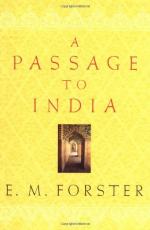|
|
A Passage to India Chapter 2
Dr. Aziz rides his bicycle over to the home of his friend Hamidullah who is having dinner with another friend Mahmoud Ali. The two were in the middle of discussing whether or not it is possible for Indians to be friends with Englishmen. Mahmoud contends that it is impossible, while Hamidullah believes that these friendships are only possible in England. Hamidullah studied at Cambridge and remembers his treatment by English people there as warm and cordial. They discuss that in India, the English come and act as polite gentlemen toward the Indians, the way the Collector of Chandrapore Mr.Turton did when he first arrived. However, after a short time, their attitudes change drastically:
"They all become exactly the same, not worse, not better. I give any Englishman two years, be he Turton or Burton. It is only the difference of a letter. And I give any English woman six months. All are exactly alike. Chapter 2, pg. 7
Topic Tracking: West vs. East 1
Hamidullah suggests that there is a difference between generations in the attitudes of the British toward the Indians. Under the reign of Queen Victoria, the treatment of Indians was much better than in the present. He recalls old friends from England who treated him very kindly when he was there and let him play with their children. Hamidullah says he knew the child, who he once carried on his shoulders, was living in India. He says he refused to visit him because he has probably already come under the influence of the Anglo-Indians there. Hamidullah fears that his friends' son would believe that he wants something from him. Mahmoud Ali only knows India after Victoria's time and as a result has to struggle to remember some instances of kindness by the British; Hamidullah can remember several instances of kindness. For Mahmoud Ali, kindness by Englishmen (and women) is an exception to the rule. During the course of their dinner, Hamidullah's wife, a distant aunt, asks Aziz when he will marry. Aziz responds that once was enough. Hamidullah tells his wife that he had already done his duty by sending all of his salary to his children, who live with his dead wife's mother. Hamidullah said that Aziz lives like a low-grade clerk. The men continue to sit around and enjoy their meal and read poetry. A servant interrupts their merriment. The servant carries a note from Chandrapore's Civil Surgeon, Major Callendar, that requests Aziz come to his house without giving a reason. The indifferent manner of the note reveals the arrogance of the Major toward the Indians. Aziz says,
"He has found out our dinner hour, that's all, and chooses to interrupt us every time, in order to show his power." Chapter 2, pg. 12
Aziz takes off quickly on his bicycle, which has no brakes or lights, and blows out one of his tires. He then jumps into a Tonga, a small type of horse-drawn carriage. When Aziz arrives at Callendar's compound, Callendar's servant tells Aziz that the Major has already left. Aziz asked if the Major left him a message and the servant says no. Aziz feels a sense of despair and is convinced that the Major had to have left a message. While he argues with the servant, two ladies, Mrs. Callendar and another British woman, walk past Aziz, ignoring his greeting with glances, and take off in his Tonga. Dejected, Aziz leaves the compound and stops for a rest at a Mosque.
The Mosque rejuvenates Aziz:
"A Mosque by winning his approval let loose his imagination. The temple of another creed, Hindu, Christian, or Greek, would have bored him and failed to awaken his sense of beauty. Here was Islam, his own country, more than a Faith, more than a battle cry, more, much more...Islam an attitude towards life both exquisite and durable, where his body and his thoughts found their home." Chapter 2, pg. 16
While Aziz is in the Mosque, an older woman walks in. Aziz interrupts her and shouts angrily that she shouldn't be in the Mosque. He tells her that the Mosque is a holy place and she has no right to enter with shoes on. The woman, Mrs. Moore, tells him that she has already removed her shoes. Aziz apologizes immediately, explaining that few women have the decency to remember to follow this custom. Mrs. Moore replies, "That makes no difference. God is here." Chapter 2, pg. 16
Her response impresses Aziz, who asks her name. Mrs. Moore tells Aziz that she stepped out of the club where they were putting on a play that she had already seen in London. They strike up an immediate friendship and talk about their children. Mrs. Moore reveals that her son is Ronny Heaslop, the City Magistrate, and that she has two more children, a son Ralph and a daughter Stella back in England. Aziz notes a similarity between them, because he also has a daughter and two sons. The two also realize that they both dislike Mrs. Callendar. Aziz begins to rant and rave about his dislike of Mrs. Callendar and the latest incident with the Tonga. He feels instantly comfortable with Mrs. Moore and is excited by the fact that she sympathizes with him. He calls her an Oriental because she understands emotions, unlike her English compatriots. Aziz escorts Mrs. Moore back to the club and she tells him that she would have liked to invite him in, but she is not a member. Aziz replies that Indians are not allowed in the club anyway. Aziz walks home happy:
"As he strolled down hill beneath the lovely moon, and again saw the lovely mosque, he seemed to own the land as much as anyone who owned it. What did it matter if a few flabby Hindus had preceded him there, and a few chilly English succeeded." Chapter 2, pg. 22




